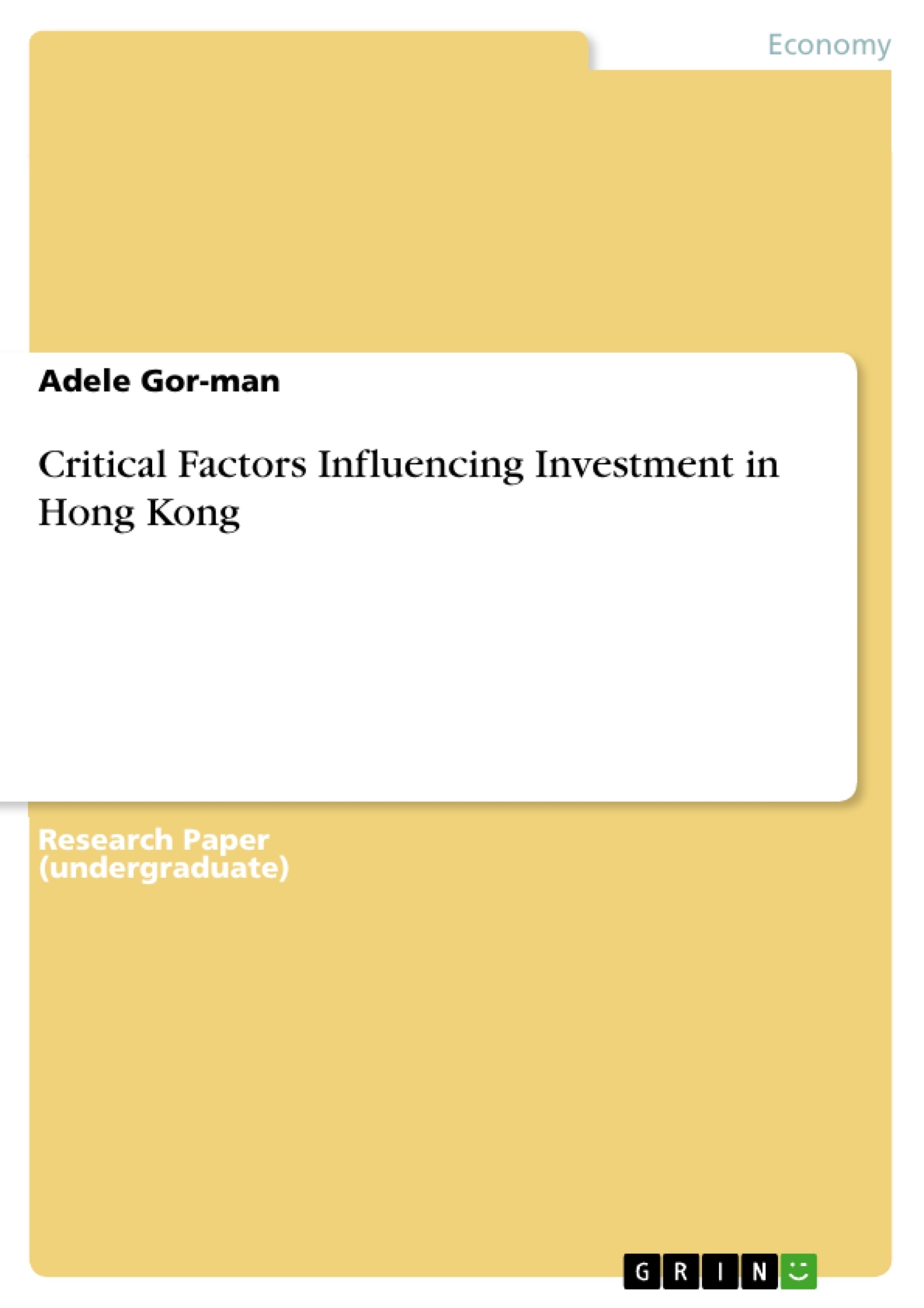As a native of Hong Kong, I spent my entire adolescence in the changing socio-political atmosphere of the city, but have never researched in detail the financial risks that the city might have or what the economy is like in Hong Kong.
The research of this paper helped me to better understand my own city, especially in regard to its financial and economical situation. It will start with a brief introduction so that the audience can also get a better idea about Hong Kong’s economy, how it was shaped, and what the future outlook will be. Hong Kong is located in East Asia, on the coast of China. It was a colony of the United Kingdom for 99 years, until July 1st 1997. It was then returned to the People Republic of China and became the Hong Kong Special Administrative Region (SAR). In the following, there will be an analysis of ten factors that influence the financial aspects within the city, trading issues in Hong Kong, and its currency.
Inhaltsverzeichnis (Table of Contents)
- INTRODUCTION
- CURRENT POLITICAL LEADERSHIP AND STABILITY
- GOVERNMENT POLICIES AND ATTITUDES TOWARDS FOREIGN INVESTMENT
- DEMOGRAPHIC TRENDS
- KEY ECONOMIC INDICATORS AND TRENDS
- UNIQUE HISTORICAL, CULTURAL, AND RELIGIOUS INFLUENCES
- GEOGRAPHIC ADVANTAGES AND DISADVANTAGES
- LOW CORRUPTION AND CRIME RATE
- KEY FINANCIAL RISKS OF INVESTING IN HONG KONG
- INTERNATIONAL TRADE IN HONG KONG
- HONG KONG DOLLAR'S PEGGED SYSTEM
- CONCLUSION
Zielsetzung und Themenschwerpunkte (Objectives and Key Themes)
This paper examines the critical factors influencing investment in Hong Kong, exploring the city's economic landscape, its historical and political context, and the key risks associated with investment. The research aims to provide a comprehensive analysis of these factors, offering insights into the current state of Hong Kong's economy and its future prospects.
- Political stability and leadership in post-handover Hong Kong
- Government policies and attitudes towards foreign investment
- Demographic trends, including the aging population and labor supply
- Economic indicators, including trade and the Hong Kong dollar's pegged system
- Financial risks associated with investing in Hong Kong
Zusammenfassung der Kapitel (Chapter Summaries)
- INTRODUCTION: This section provides an overview of Hong Kong's economic landscape, its history, and its current political situation. It highlights the significance of understanding the financial and economic aspects of Hong Kong, particularly in light of its unique political history.
- CURRENT POLITICAL LEADERSHIP AND STABILITY: This chapter analyzes the political landscape of Hong Kong following the handover from the United Kingdom to China in 1997. It discusses the "One Country, Two Systems" policy and its impact on political stability and governance, highlighting challenges and concerns related to political leadership in the city.
- GOVERNMENT POLICIES AND ATTITUDES TOWARDS FOREIGN INVESTMENT: This section delves into the Hong Kong government's policies and attitudes towards foreign investment. It emphasizes the government's commitment to a laissez-faire approach, promoting a free market environment with minimal restrictions on foreign investment and highlighting key factors attracting investment to Hong Kong.
- DEMOGRAPHIC TRENDS: This chapter examines the demographic trends in Hong Kong, specifically focusing on the challenges posed by the aging population. It discusses the implications of these trends for the economy, labor market, and future GDP growth.
Schlüsselwörter (Keywords)
The key focus of this paper lies in understanding the critical factors influencing investment in Hong Kong, with particular attention to the political and economic landscape, demographic trends, and financial risks associated with investment in the region. Key terms include: foreign investment, political stability, economic freedom, demographic trends, aging population, labor supply, financial risks, international trade, and the Hong Kong dollar's pegged system.
Frequently Asked Questions
What is the "One Country, Two Systems" policy?
It is a constitutional principle of China describing the governance of Hong Kong after 1997, allowing the city to maintain its own economic and administrative systems while being part of China.
Why is Hong Kong attractive to foreign investors?
Hong Kong offers a free-market environment, minimal restrictions on capital, low corruption, a stable legal system, and a strategic location as a gateway to China.
How does the pegged currency system work in Hong Kong?
The Hong Kong Dollar is pegged to the US Dollar, providing exchange rate stability which is crucial for international trade and financial services.
What are the main demographic challenges for Hong Kong's economy?
The city faces an aging population and a shrinking labor supply, which could negatively impact long-term GDP growth and increase social welfare costs.
What are the key financial risks of investing in Hong Kong?
Risks include political instability following the handover, dependency on the Chinese economy, and potential fluctuations in the global trading environment.
- Quote paper
- Adele Gor-man (Author), 2014, Critical Factors Influencing Investment in Hong Kong, Munich, GRIN Verlag, https://www.grin.com/document/359242



